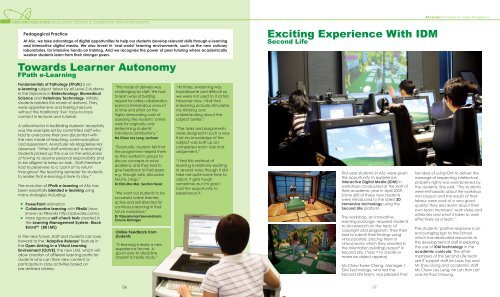pg 0 cover - School of Applied Science - Temasek Polytechnic
pg 0 cover - School of Applied Science - Temasek Polytechnic
pg 0 cover - School of Applied Science - Temasek Polytechnic
You also want an ePaper? Increase the reach of your titles
YUMPU automatically turns print PDFs into web optimized ePapers that Google loves.
ENRICHING EDUCATION DEVELOPING STUDENTS & CELEBRATING THEIR ACHIEVEMENTS<br />
Pedagogical Practice<br />
At ASc, we take advantage <strong>of</strong> digital opportunities to help our students develop relevant skills through e-learning<br />
and interactive digital media. We also invest in ‘real-world’ learning environments, such as the new culinary<br />
laboratories, for intensive hands-on training. And we recognise the power <strong>of</strong> peer tutoring where academically<br />
weaker students learn from their stronger peers.<br />
Towards Learner Autonomy<br />
FPath e-Learning<br />
Fundamentals <strong>of</strong> Pathology (FPath) is an<br />
e-learning subject taken by all Level 2 students<br />
in the Diplomas in Biotechnology, Biomedical<br />
<strong>Science</strong> and Veterinary Technology. Initially,<br />
students resisted this mode <strong>of</strong> delivery. They<br />
were apprehensive and feeling insecure<br />
without the traditional ‘live’ face-to-face<br />
contact in lectures and tutorials.<br />
A critical factor in facilitating students’ receptivity<br />
was the example set by committed staff who<br />
had to overcome their own discomfort with<br />
the new mode <strong>of</strong> teaching, communication<br />
and assessment. As lecturer Ms Magdeline Hor<br />
observed, “When staff embraced ‘e-teaching’,<br />
students picked up the cue on the seriousness<br />
<strong>of</strong> having to assume personal responsibility and<br />
to be diligent to keep on-task. Staff therefore<br />
had to persevere to a ‘point <strong>of</strong> no return’<br />
throughout the teaching semester for students<br />
to realise that e-learning is here to stay.”<br />
The evolution <strong>of</strong> FPath e-learning at ASc has<br />
been essentially blended e-learning using<br />
many strategies including:<br />
PowerPoint animation<br />
Collaborative learning with PBwiki (now<br />
known as PBworks http://pbworks.com/).<br />
More rigorous self-check tests created in<br />
the Learning Management System- Black<br />
Board TM (BB LMS)<br />
In the near future, staff and students can look<br />
forward to the ‘Adaptive Release’ feature in<br />
the Open Linking in a Virtual Learning<br />
Environment (OLIVE), the new LMS, which will<br />
allow creation <strong>of</strong> different learning paths for<br />
students who can then view content or<br />
participate in class activities based on<br />
pre-defined criteria.<br />
“This mode <strong>of</strong> delivery was<br />
challenging for staff. We had<br />
to learn ways <strong>of</strong> building<br />
rapport for online collaboration,<br />
spend a tremendous amount<br />
<strong>of</strong> time and effort on the<br />
highly demanding work <strong>of</strong><br />
assessing the students’ online<br />
work for originality and<br />
determining students’<br />
individual contributions.”<br />
Ms Chew Lay Leng, Lecturer<br />
“Eventually, students felt that<br />
the programme helped them<br />
as they worked in groups to<br />
discuss concepts or solve<br />
problems, and they had to<br />
give feedback to their peers<br />
e.g. through wikis, discussion<br />
forums, blogs.”<br />
Dr Khin Mar Mar, Section Head<br />
“We want our students to be<br />
successful online learners,<br />
active and self-directed for<br />
continuous learning in their<br />
future workplace.”<br />
Dr Vijayakumari Seevaratnam,<br />
Course Manager<br />
Online Feedback from<br />
students<br />
“E-learning is really a new<br />
experience for me. A<br />
good way to discipline<br />
oneself to really study.”<br />
06<br />
“At times, e-learning was<br />
troublesome and difficult as<br />
we were not used to it at first.<br />
However now, I find that<br />
e-learning actually stimulates<br />
my thinking and<br />
understanding about the<br />
subject better.”<br />
“The tasks and assignments<br />
were designed in such a way<br />
that my knowledge <strong>of</strong> the<br />
subject was built up as I<br />
completed each task and<br />
assignment.”<br />
“I find this method <strong>of</strong><br />
learning is relatively exciting<br />
in several ways though it did<br />
take me quite some time to<br />
adjust. It gets tough<br />
sometimes but I'm glad I<br />
had the opportunity to<br />
experience it.”<br />
Exciting Experience With IDM<br />
Second Life<br />
First-year students in ASc were given<br />
the opportunity to experience<br />
Interactive Digital Media (IDM) in<br />
workshops conducted at the start <strong>of</strong><br />
their academic year in April 2009.<br />
Some 600 <strong>of</strong> these new students<br />
were introduced to the latest 3D<br />
immersive technology using the<br />
Second Life platform.<br />
The workshop, an innovative<br />
learning package, required students<br />
to do research on the topic <strong>of</strong><br />
copyright and plagiarism. They then<br />
had to submit their findings using<br />
virtual posters, placing them in<br />
virtual rooms which they created in<br />
the orientation buildings rezzed* in<br />
Second Life. (*rezz = to create or<br />
make an object appear)<br />
Ms Chew Swee Cheng, Manager /<br />
IDM Technology, who led the<br />
Second Life team, was pleased that<br />
07<br />
AScientia Passion to make it happen!<br />
her idea <strong>of</strong> using IDM to deliver the<br />
message <strong>of</strong> respecting intellectual<br />
property rights was well received by<br />
the students. She said, “The students<br />
were enthusiastic about the workshop<br />
mini project and the results <strong>of</strong> their<br />
labour were work <strong>of</strong> a very good<br />
quality! They also learnt about their<br />
own team members’ work styles and<br />
attributes and what it takes to work<br />
effectively as a team.”<br />
The students’ positive response is an<br />
encouraging sign to the <strong>School</strong><br />
which has dedicated resources to<br />
the development <strong>of</strong> staff in exploring<br />
the use <strong>of</strong> IDM technology in the<br />
academic curricula. The other<br />
members <strong>of</strong> the Second Life team<br />
are IT support staff Mr Louis Tay and<br />
Mr Zhou Liang and academic staff<br />
Ms Chew Lay Leng, Mr Loh Han Liat<br />
and Mr Paul Cheung.


